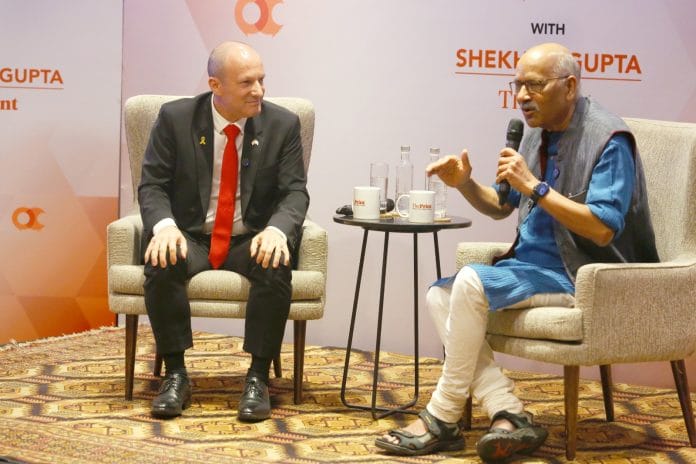Gurugram: Israel is not in the “business” of changing regimes or redrawing maps in West Asia like Turkey or Iran, said Reuven Azar, the Israeli ambassador to India at ThePrint’s Off The Cuff Monday.
“We are not in the business of redrawing the map of the Middle East. Israel is pretty different from other powers in the region. And you could see that very clearly following the turmoil that started in 2011, what was called the Arab Spring. You had Arab countries that collapsed or that entered into a huge turmoil. Israel didn’t interfere there to try to determine their political future,” Azar said, in conversation with Shekhar Gupta, ThePrint’s Editor-in-Chief at The Quorum, Gurugram.
Azar added: “There were other countries that did interfere, like for example, Iran and Turkey. So we are in the business of trying to serve our interests. And as much as we are concerned with dealing with our threats, we are trying to also grasp opportunity.”
The “opportunity” indicated by the Israeli envoy is the Abraham Accords—a series of treaties which normalised ties between Tel Aviv and a number of countries in the region, including the United Arab Emirates (UAE), Bahrain, Morocco and Sudan.
The Accords, which were signed between September 2020 and January 2021, were one of the most hard-won geopolitical battles in West Asia and North Africa this decade. They build on the Camp David Accords, which saw Israel and Egypt agree to peace at the end of the 1970s and the peace treaty between Jordan and Tel Aviv, signed in 1994.
The agreements aimed to normalise diplomatic ties between Israel and the aforementioned states, eventually creating common interests between countries that for over seven decades had had none.
“This has nothing to do with redrawing maps. It’s just a matter of fulfilling the common interest we have with those countries that are more pragmatic in our region and are interested like us to promote stability and connectivity,” Azar said, explaining the Accords.
The Israeli envoy, when asked about why Tel Aviv did not push for regime change in Iran, made it clear that Israel has no capabilities to drag its “conscript” army to impose such changes. Tel Aviv launched Operation Rising Lion on 13 June, striking at key Iranian nuclear facilities and military personnel.
Within days at least 10 senior Iranian generals and a number of nuclear scientists were killed by Israel’s military operation. The US joined in the strikes on 21 June, through Operation Midnight Hammer, which struck Tehran’s nuclear facilities at Fordow, Natanz and Isfahan.
“I don’t remember any case in which there was regime change from the air, okay? So nobody was planning to invade Iran or to take care of a nation of 100 million people. And therefore (Israel), as a democracy, which, you know, is accountable to its people, that actually has a conscription army, we are not in the business of, you know, dragging our people to endless wars to change the political landscape in other countries,” said Azar.
The ambassador added: “We are not capable of doing it. We don’t have the will, okay? …and of course, you know, I would be very happy if there would be a regime change in Iran, but it depends on the Iranian people.”
In the 12-day war, Israel gained air superiority over Iran. Tehran, in its retaliatory operation—True Promise 3—sought to strike at Israel using ballistic missiles. The Israeli air defence systems were able to intercept roughly 90 percent of Iran’s missiles. However, the use of ballistic missiles by Iran saw a number of buildings hit and 29 Israelis killed, while over 3,000 were injured.
According to Iranian officials, 935 people were killed by Israeli air strikes in the West Asian nation. The air superiority gained by Israel allowed the US’ B2 stealth bombers to enter Iranian airspace unhindered and drop ‘bunker buster’ bombs at Fordow and Natanz. Fordow, Iran’s most fortified uranium enrichment site was buried deep underground.
The US has claimed to have “completely obliterated” the site. At least two such bombs were also used at Natanz. However, any assessments of the true damage to the nuclear programme of Iran will take time to be reported.
“What is important in our perspective is that… the fact that Iran will continue to possess fissile material that is enriched to a high level doesn’t mean that they will be able to reconstitute their nuclear plan that easily, because we have destroyed their centrifuges factory,” Azar said.
The Israeli ambassador added: “We have hit dozens of sites that were related to the nuclear programme and we continue to have penetration into the Iranian system and the resolve to deal with the situation in which Iran re-embarks on a military nuclear plan.”
(Edited by Viny Mishra)






